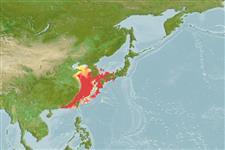Preferred temperature (Ref.
115969): 16.7 - 23.4, mean 20.9 (based on 31 cells).
Phylogenetic diversity index (Ref.
82804): PD
50 = 0.5312 [Uniqueness, from 0.5 = low to 2.0 = high].
Bayesian length-weight: a=0.00851 (0.00775 - 0.00935), b=3.08 (3.05 - 3.11), in cm Total Length, based on LWR estimates for this species (Ref.
93245).
Trophic level (Ref.
69278): 4.1 ±0.7 se; based on diet studies.
Resilience (Ref.
120179): High, minimum population doubling time less than 15 months (K=0.76; tm=1).
Prior r = 0.57, 95% CL = 0.37 - 0.85, Based on 1 data-limited stock assessment.
Fishing Vulnerability (Ref.
59153): Low to moderate vulnerability (34 of 100).
Climate Vulnerability (Ref.
125649): Low to moderate vulnerability (34 of 100).
